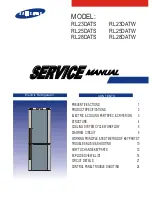
7
7-1 Compressor
7-2 Overload protector
7. WORKING PRINCIPLE & TEST METHOD ON KEY PARTS
The compressor motor, mounted directly to the
compressor and located inside a sealed steel
case, has two windings.
One is a start winding and the other a run winding.
The windings are connected together internally,
forming a common connection. A lead is connected
to each of the windings, and to the common
connection. These three leads are then connected
to glass-sealed terminals that extend through the
compressor case.
The terminals are clustered in al trangle ( pyramid )
pattern and, reading from left to right, are identified:
Start, Common and Run.
1) Measure the resistance of each winding of the
compressor.
a. Disconnect the power cord.
b. Remove the relay from the compressor.
C. Measure the resistance of each winding.
A. The highest resistance value is the measurement of
the "start" and "run" terminals whose windings are
connected in series.
B. The lowest resistance value is the measurement of
the "run" and "common" terminals.
C. The mid-level resistance
value is the measururement
of the "start" and "common"
terminals.
B + C = A
2) Measure each terminal and
ground with the ohmmetor
set to the highest range.
If a winding is found to be
either open or shorted to
ground, the compressor
has failed.
Operating principle
Inspection method
Compressor Windings
Operating principle
Inspection method
The overload protects the compressor motor by
responding to both the temperature and current.
The overload protector is basically made up of
a set of the contacts normally closed and the
bimetal element.
The overload, mounted externally and in direct
contact with the compressor case, is connected
in series with both windings of the motor.
If the motor fails to start for any reason, the heavy
locked rotor current will cause the bimetal element
to heat which then quickly flex, snapping the
contacts open and interruption current flow through
the motor.
Likewise, if the motor overheate to an unsefe leval,
the comination of current and temperature will cause
the bimetal to snap the contacts open, On cooling,
the bimetal flex back and snaps the contacts closed.
The motor will continue to cycle on the overload so
long as the oriqinal reason for tripping persists
1) Check for continuity with ohmmetor.
- If the overlosd is tripped, cheak continuity after
waiting until it has cooled, in the room ambient
before checking.
- Even though the continuity of the overload is
observed it is difficult to confirm that the overload
is operating within the specification limits.
If there is any doubt, replace it with a part with
identical specifications.
: An overload should NEVER be by-passed
in the circuit , not even as a temporary
measure until the proper replacement can
be installed.
Summary of Contents for RL23DATS
Page 15: ...14 10 EXPLODED VIEW LIST 10 1 Door ...
Page 16: ...15 No Part number Description Q ty Spec Remark ...
Page 17: ...16 10 2 Compartment ...
Page 18: ...17 No Part number Description Q ty Spec Remark ...
Page 19: ...15 10 3 General assembly ...
Page 20: ...19 No Part number Description Q ty Spec Remark ...
Page 21: ...20 No Part number Description Q ty Spec Remark ...
Page 28: ......









































